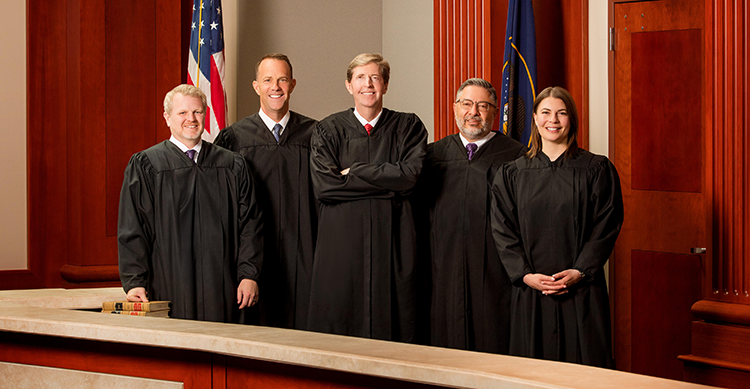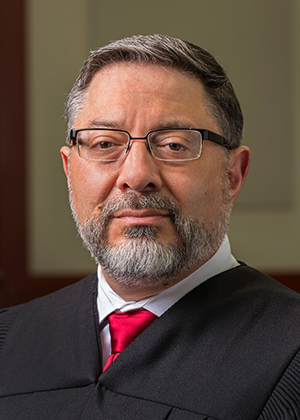Utah embraces nonlawyer ownership of law firms as part of broad access-to-justice reforms

The Utah Supreme Court. From left to right: Justice John A. Pearce, Associate Chief Justice Thomas R. Lee, Chief Justice Matthew B. Durrant, Justice Constandinos "Deno" Himonas and Justice Paige Petersen.
The Utah Supreme Court has unanimously approved a slate of reforms that allow for nonlawyer ownership or investment in law firms and permit legal services providers to try new ways of serving clients during a two-year pilot period.
The court said the measures adopted Wednesday, including related ethics rules changes, “represent perhaps the most promising effort by courts to tackle the access-to-justice crisis in the last hundred years.”
“What has become clear during this time is that real change in Utahns’ access to legal services requires recognition that we will never volunteer ourselves across the access-to-justice divide and that what is needed is market-based, far-reaching reform focused on opening up the legal market to new providers, business models, and service options,” the court wrote in a standing order detailing many of the reforms.
The court also noted that the COVID-19 pandemic and its economic fallout have resulted in the public’s need for affordable legal services reaching “crisis levels.”
While other nations such as the United Kingdom and Australia have embraced alternative business structures in the legal industry, U.S. jurisdictions have been more resistant.

Justice Deno Himonas.
In Utah, nontraditional legal services entities will have the opportunity to operate in a regulatory sandbox the state supreme court has established. The court also created an Office of Legal Services Innovation that will evaluate and recommend sandbox applicants to the court, as well as oversee the applicants that are approved for entry into the sandbox.
Earlier this year, Utah began accepting sandbox proposals from applicants who believe they could provide low-cost or no-cost legal services addressing issues stemming from COVID-19. Utah Supreme Court Justice Constandinos “Deno” Himonas tells the ABA Journal that the proposals received to date have been very promising, and he expects more to come that will cover a wide range of legal issues.
“I’m hoping to see some innovations that have not really been imagined,” says Himonas, adding that new capital in the industry should help fuel change.
Sandbox participants that are able to demonstrate their legal services “do not cause levels of consumer harm above threshold levels” established by the innovation office may receive approval to exit the sandbox and continue practicing law, according to the court’s standing order.
At the conclusion of a two-year period that began Friday, the court said it will evaluate whether the core reforms it has approved should continue “based on a review of data collected from those entities and individuals participating in the program.”
Additionally, changes to Utah’s Rules of Professional Conduct that became effective Friday include a new Rule 5.4A that permits attorney fee sharing with nonlawyers as long as there is written notice to the client.
The Utah Supreme Court had released reform proposals for public comment in April in response to efforts by a Work Group on Regulatory Reform and a subsequent Implementation Task Force on Regulatory Reform, both of which were co-chaired by Himonas and former Utah State Bar President John Lund.
Gillian Hadfield, a University of Toronto law professor who served on the two Utah regulatory reform panels, wrote on Twitter Thursday that she was “SO excited to have played a part in this historic move.”
“Utah has acted where so many other states have merely formed yet another study group to solve the unconscionable lack of access to reasonably priced legal help that lawyer (and court!) regulation has created,” Hadfield tweeted.
Utah’s actions have also drawn praise from regulatory reform advocates across the country, including those in other states considering opening up their legal marketplaces.

Image from Shutterstock.com.
“While I wish it was California that was undertaking such historic measures, I applaud the Utah Supreme Court for being the first in the nation to meaningfully attempt to address the inability of so many to receive affordable legal services,” says Joanna Mendoza, who served on a California task force that advocated for broad regulatory reforms.
“It will be better for everyone when several states, including California, have adopted similar changes as it will make it more likely to result in serious investment into new forms of providing legal services across the country,” Mendoza adds.
Jayne Reardon, a member of a task force in Illinois that has recommended regulatory reforms, called the Utah Supreme Court’s actions on re-regulation “remarkably bold.”
“The data that will be gathered in Utah will help inform efforts underway in other states, including Illinois,” Reardon wrote in an email. “I am hopeful that re-regulation of legal services will help reduce the access to justice gap as well as help the profession to thrive and regain relevance.”
In Arizona, the state supreme court is scheduled later this month to review proposed rules changes that would permit alternative business structures featuring nonlawyers.
Himonas says he is also hopeful Utah’s approach will propel other states forward in their efforts.
“If it works, then I think we are going to see a lot of states follow,” he says.



